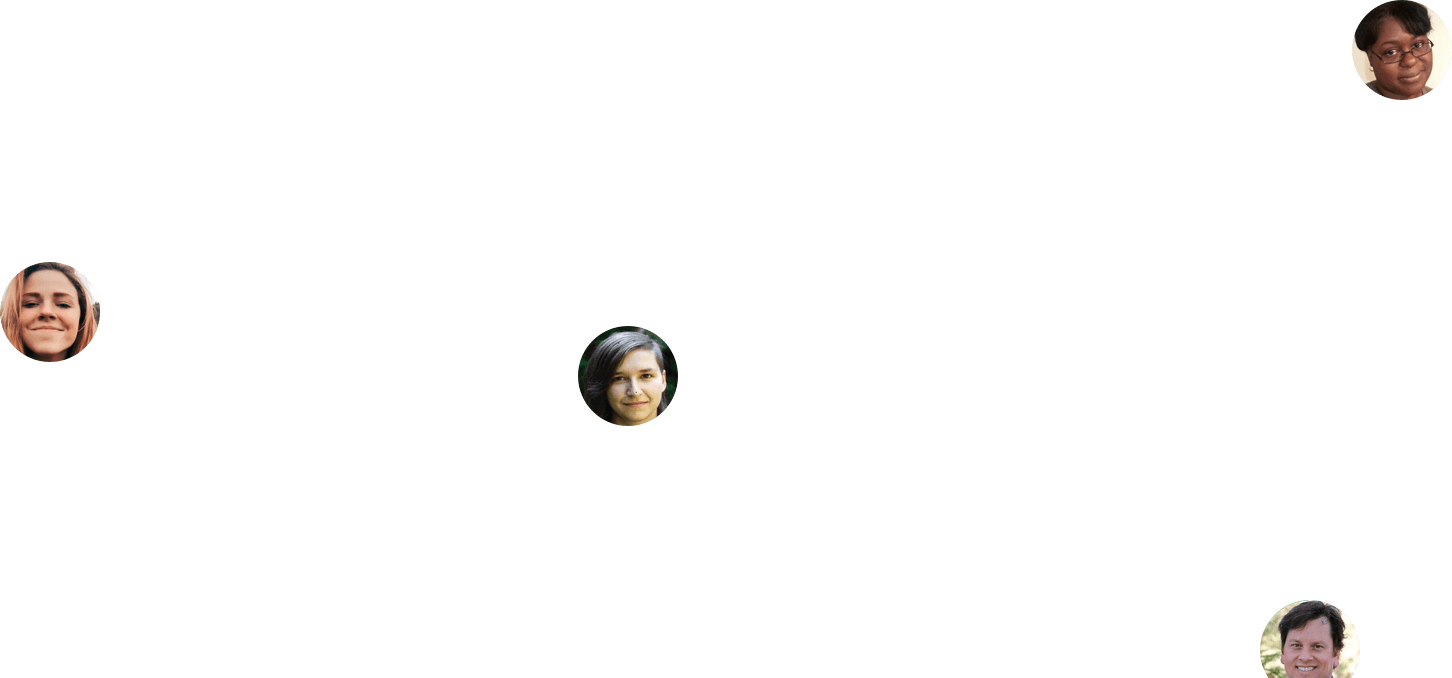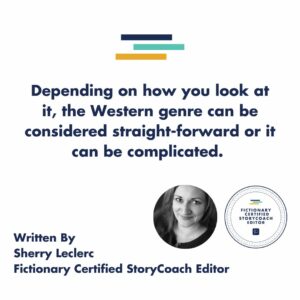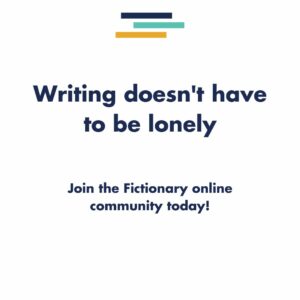Introduction
Many people think that the western genre is dead: that it ended with stories like Shane, Wyatt Earp, and Gunfight at the OK Corral. And it is true that the time when the American frontier was expanding west is no longer commonly seen in stories.
So, you may be surprised to know that the western genre is still alive and kicking.
It often disguises itself by mixing with other genres, but it is still relevant. If you are interested in learning everything you need to know about the Western genre, including what it is and how to write it, then read on.

What is the Western Genre?
The Western is a genre that was originally set in a particular place and time – the American frontier, mostly west of the Mississippi, back when American society was expanding into areas previously only occupied by Native Americans. So, for the most part, these were set from “the 1850s to the end of the 19th century” (Britannica.com, Western Narrative Genre).
Westerns “tell the stories of cowboys, settlers, and outlaws exploring the western frontier and taming the Wild West” (Masterclass, What is the Western Genre?).
Eventually the form began to expand.
For example, the article Western Narrative Genre by Britannica online states that “the western had its counterparts in the gaucho literature of Argentina and in tales of the settlement of the Australian outback.”
And, as this article explains, Westerns were also “partially replaced by the space epic, a genre in which often all the aspects of a Western were utilized but the setting.”
More Modern Takes on the Western Genre
Author John Truby, in his book The Anatomy of Genres: How Story Forms Explain the Way the World Works, asserts “the traditional Western didn’t die. It traveled to the future and became the Science Fiction Western.” In this case, instead of the vast empty plains of the American west, the setting becomes the vast expanse of outer space.
Dawn of the Planet of the Apes, The Mandalorian, and Guardians of the Galaxy are all examples of Science Fiction Westerns, or Space Westerns.
Themes in the Western Genre
The Western genre was originally the embodiment of the “American Dream” – the idea that an individual can go anywhere and become anything they want. It was about individualism and freedom. And, on a larger scale, it was about “nation building, about transforming wilderness into civilization” (Truby, J., The Anatomy of Genres, p. 403).
To take this a little further, the article Western and Eastern Genre: Stories of Subjugation and Freedom on the Story Grid website says that the genre “focuses on the conflict between individual and society.” This article also states that the question every Western story asks is: “Is the autonomous, self-reliant individual in society dangerous to law and order or necessary to protect the powerless from tyranny?”
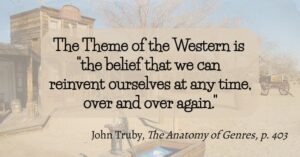
Characters and motivation
Westerns always have a protagonist, a victim, and an antagonist. The inciting incident for Westerns usually occurs when the protagonist, who is attempting to escape civilization, comes across innocent people who are being terrorized by some tyrannical figure.
This tyrannical figure—the antagonist—is usually after something the victims have (like the land a homestead is on).
Truby says that “the true western hero is the cowboy” (p. 404). But this doesn’t have to be the horse riding, cowboy hat- and boots-wearing man we picture when thinking about Wyatt Earp and the Lone Ranger.
Rather, it is “the individual who can pick up stakes and go,” even if that individual doesn’t wear spurs and ride a horse.
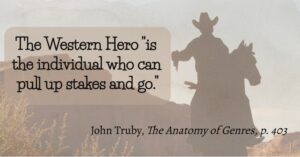
In the Space Western, this definition of the hero still applies.
In Guardians of the Galaxy, Peter Quill, a.k.a. Starlord, is this hero. In Star Wars, Han Solo is the epitome of a space cowboy.
In both of these movies, our heroes are those gun- (or blaster-) toting outlaws who are venturing into little explored, unsettled, or lawless areas of space. They are flying around in their space ships, sometimes breaking laws, when they encounter victims who are suffering at the hands of tyrannical villains.
Neither of these two heroes can be considered law-abiding citizens, but they both have a moral code they follow, which is why they step in when their help is needed (although Han would likely argue that he’s in it for the credits).
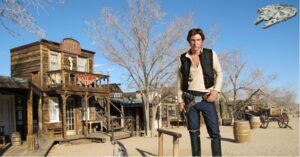
Han Solo, Space Cowboy
To understand more about characters and motivation in the Western, the article on StoryGrid.com states that the motivation or need of the protagonist “arises from an inciting attack in which the antagonist (human, animal, or environmental) threatens the peace so much that the protagonist must risk subjugation or control by the larger society to restore order.”
The protagonist can be a cowboy, a gunfighter, a marshal, the new sheriff in town, or another representation of these. However, the hero acts outside the law while upholding a moral code.
The victim is the individual or group that is threatened.
The antagonist is who or what is threatening the peace and freedom of the victim.
Example
Let’s look at a classic Western novel that was required reading for me in junior high: Shane, by Jack Shaefer.
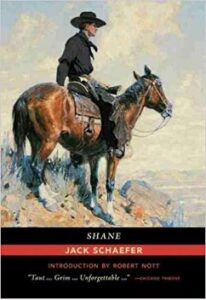
Shane, by Jack Shaefer (1949)
In this novel, Shane, the protagonist, was heading out into the wilderness and away from civilisation in an attempt to leave his gunslinging days behind him.
When he encounters a group of homesteaders being subjected to violent intimidation by a cattle driver, he has to decide if he will stop and help them protect their land or leave them to fend for themselves.
- Protagonist: Shane, a cowboy and former gunslinger heading out to the frontier to “reinvent” himself
- Victims: The homesteaders
- Antagonist: Luke Fletcher, a cattle driver who tries to force the homesteaders off their land
Things to Include in a Western Story
There are certain things that are necessary in any Western story. These are:
- The Protagonist: a cowboy, outlaw, marshal, sheriff, or a representation of one of these. This is the character who is free to pick up stakes and explore the unknown, which is what they’ll be doing at the start of the story.
- The Setting: the frontier—a wilderness or an unexplored and/or uncivilized place. In the original Western, this was the wide-open plains of the American west. In the Space Western, these can be unexplored areas of outer space or new civilizations where the rule of law has not yet taken hold.
- The Inciting Incident: the free-spirited, lawless hero ventures into the unknown, trying to escape civilization, when they encounter the victim being threatened by the tyrannical antagonist.
- A Moral Code: Even when the protagonist is an outlaw or a gunslinger, they live by a moral code that makes it impossible for them to walk away from the conflict between the innocent victim and the antagonist.
- The Victim: the character or group brave enough to venture into the unknown who now have to protect their homes and lives from the villain.
- The Antagonist: the cattleman or the tyrant who is threatening the safety and freedom of the victim.
- The Climax: the ‘big showdown’ where the protagonist is forced “to choose between sacrificing their autonomy and subjugating themselves to the needs of the community in order to save the victim” (Story Grid).
Tips for Writing a Story in the Western Genre
Aside from including what I outlined above, here are a few more tips to help you write your Western story:
- Read as many books in the Western genre as you can
- Watch old Western movies and TV shows, like The Lone Ranger, Bonanza, Tombstone, etc.
- Research the often differing, yet not mutually-exclusive views of other writers, editors, and professionals who have written about the Western genre (for example, John Truby and the Story Grid blog writers look at the Western from vastly different perspectives, but they are both worth reading and have important points to consider).
Conclusion
Depending on how you look at it, the Western genre can be considered straight-forward or it can be complicated. However, because of its grand themes that mirror the past, present, and future in the real world, the interesting plots, and the characters, it is a genre well worth exploring.
References and Further Reading
https://www.britannica.com/art/western
https://storygrid.com/western-eastern-genre/
https://en.wikipedia.org/wiki/Western_(genre)
Truby, J., The Anatomy of Genres: How Story Forms Explain the Way the World Works. Picador, 2022
Article Written by Sherry Leclerc

Sherry Leclerc is a Fictionary Certified StoryCoach editor, Fictionary content creator, Writer’s Digest certified copy editor, and independent author. She is a member of Editor’s Canada, the Canadian Authors Association (CAA), and The Alliance of Independent Authors (ALLi).
Sherry holds a B.A. in English Language and Literature and a B.Ed. She is the sole proprietor of Ternias Publishing, through which she offers various editorial services. She also has a YouTube channel where she has a vlog about writing and editing, titled The Mythic Quill. You can find it on Youtube .
Sherry currently lives in Sydney, Nova Scotia, Canada. You can contact her at sherry@terniaspublishing.com or sherry@sherryleclerc.com
Want to be part of a writing and editing community with kindness at its heart?
Do you know about the free Fictionary community? We’re connecting writers and editors who all speak the same story editing language.
You’re most welcome to join.
- Connect with other writers and editors
- Get your editing questions answered by Fictionary Certified StoryCoach editors
- Access free, live editing classes presented by editing experts
- Learn about all things Fictionary: product updates, videos, webinars, best practices

